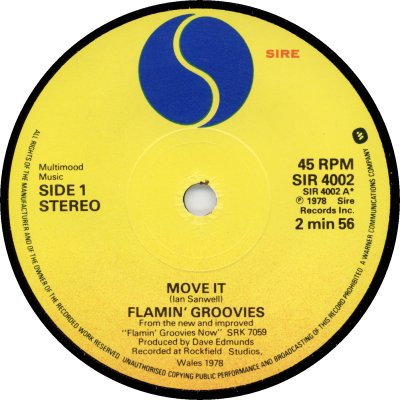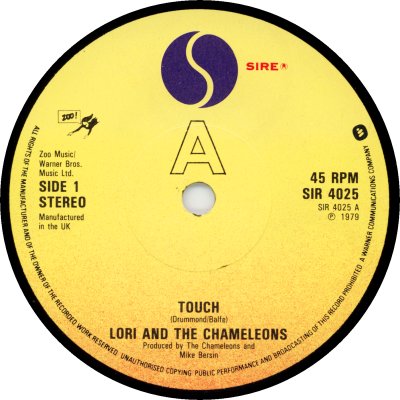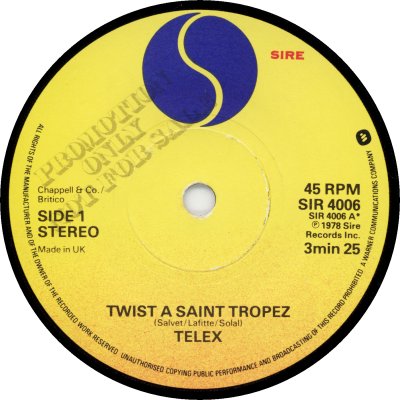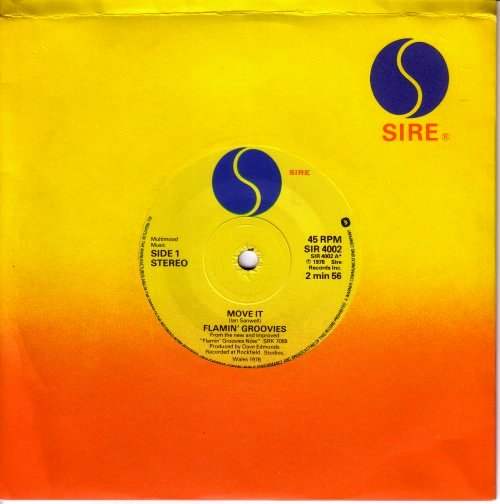










American, out of New York. Sire started out as a production and management company. 'Billboard' of the 9th of July 1966 reported that, along with two associated publishing companies, Sire Productions and Management had been formed by Richard Gottehrer; he was scouting for writers and looking to sign production pacts - one single deal had been agreed already. A year later 'BB' of the 8th of July 1967 mentioned in passing that Sire's management included Seymour Stein, who had just concluded a licensing deal with King Records. By the time that 'BB' of the 20th of July 1968 came out he was the company's vice president, and he was to go on to play a prominent part in Sire's affairs. Sire entered the record market in early 1968. 'BB' of the 3rd of February of that year noted that the Sire Record Corporation had signed two artists, The Jam and the Trans Atlantic Railroad, and that it intended to run two labels, Sire and Phoenix. 'BB' of the 6th of April added that distribution of both was to be by Pickwick International, and that the first single on Phoenix, by David Santo, had just been released. Phoenix proved to be short-lived, releasing just one album and three singles, all of them in 1968, but the Sire label survived and grew.
Sire showed early signs of ambition. 'BB' of the 10th of August 1968 revealed that London / Decca was to handle Sire worldwide except for the USA, Canada and Italy; a couple of months later, 'BB' of the 26th of October was able to say that London was taking over distribution for the first two countries. The first single under the new deal, 'Honey Do' by The Strangeloves, was given a full page advert in 'BB' of the 2nd of November. A new label design was adopted at the time of the deal. The same issue of 'BB' announced that Gottehrer and Stein had formed a close relationship with Mike and Richard Vernon's 'Blue Horizon' label, from the UK: Blue Horizon was opening an office in New York and Gottehrer and Stein were to be the company's representatives in America. The relationship must have proved mutually satisfactory, as 'BB' of the 24th of May 1969 described the American arm of Blue Horizon as being 'jointly owned' by Sire and the Vernons. 'BB' of the 20th of February 1970 contradicted this slightly by saying that Stein was the director and the Vernons the owners, but by the summer of the year work was starting on a new shared headquarters, 'Blue Horizon House', which incorporated a studio, rehearsal rooms, offices and a record shop, and the companies were being referred to as 'Sire / Blue Horizon' ('BB', 5th May 1971).
Sire kept a close eye on Britain and Europe, and from the spring of 1969 through 1975 its releases were mainly licensed from abroad, though there were some home-produced ones. As a result of deals with the likes of EMI names familiar in Britain such as Barclay James Harvest and Cliff Richard appeared on Sire in the States, but several artists from other UK labels such as Decca, Transatlantic, DJM and Philips also featured. The signing of Dutch artists Focus ('BB', 1st August 1970) proved to be an inspired move in terms of sales - 'BB' of the 10th of November 1973 was able to state that the band's 'Focus 3' LP had been certified gold. Sire's experience of handling licensing deals in many countries led to it forming a company, Inter-Rep, to provide a service to other American and Canadian companies which wanted to source product from overseas ('BB', 19th October 1970). On the home front there were signs of a parting of the ways with London / Decca: 'BB' of the 30th of June broke the news that Polydor was to handle Sire worldwide with the exceptions of America, Canada, France and Italy. Sire product in the affected territories was to be issued on the Polydor label with a Sire logo, and the arrangement was to be effective 'immediately'. There seems to have been a delay, as it wasn't until the 12th of December that 'Record Retailer' was able to state that Sire and Polydor had signed a deal in the UK. Early the following year Polydor took over the distribution of Sire records in the USA; 'BB' of the 23rd of January claimed that the agreement with Decca had several months left to run but had been terminated amicably. Popular items were to be repackaged, and the first releases were planned for mid March.
The distribution agreement with Polydor lasted for just under eighteen months; in the late autumn of 1972 'BB' of the 28th of October reported that the Famous Music Corporation was to take over the job. Sire joined forces with importers Jem Records in 1973 to launch a new label, Passport, which was intended to be devoted to British and European Rock. When Renaissance and Stackridge came on board in 1974, however, they joined the Climax Blues Band on the main Sire label. Passport continued as a joint venture into late 1977; 'BB' of the 12th of November of that year observed that Sire and Jem had parted company, with Jem taking over sole responsibility for the Passport label. A buyout of Famous by ABC in 1974 led to Sire / Passport suing Famous, alleging breach of contract and lost sales ('BB', 10th August), but ruffled feathers appear to have been smoothed down quickly and ABC began handling Sire. An ABC advert in 'BB' of the 12th of December 1974 indicated that Sire and Passport were doing well, with seven LPs between them in the National Chart, including records by Nektar as well as the Climax Blues Band, Renaissance and Stackridge.
Sire continued to deal in mainly licensed material until 1976, when it took its place in the vanguard of American Punk Rock by signing the Ramones. That band's success led to further 'New Wave' signings, that being the term which Seymour Stein preferred ('BB', 20th November 1976). Arguably the most influential of those signings was Talking Heads. 'BB' of the 8th of October 1977 was able to report that Sire was giving a big promotional push to its New Wave bands; at that point Richard Hell & The Voidoids, the Dead Boys and The Saints all had albums on Sire to go with ones by Ramones and Talking Heads. Stein was plainly an enthusiast for the genre, as 'BB' of the 14th of January 1978 carried a feature in which he advocated and defended the new music. By that time Sire had changed distributors again, from ABC to Warner Bros. ('BB', 18th June 1977). Sire's enthusiasm for New Wave didn't please some of its other artists: according to 'BB' of the 15th of July 1978 Annie Haslam of Renaissance had expressed concern about the labels 'heavy commitment' to it, and she wasn't alone.
Sire's relationship with Warner Bros. evolved from a distribution / marketing one to a licensing one in the summer of 1978. 'BB' of the 18th of June said that the new deal was a long-term one; Seymour Stein was to be Sire's managing director, and the first records under the new arrangement were due to appear in mid July. WEA celebrated by having a 'Sire Week', with concerts, advertising and merchandise to accompany the release of the first LPs under the deal ('BB', 15th July). Despite enjoying success with American bands Sire kept alert for promising product from other countries. It licensed records by Belgian electronic / Disco band Telex, picked up the rights to Boney M when Atlantic decided not to renew their interest, and towards the end of the decade scored a No.1 in the Hot 100 with 'Pop Muzik' by M. 'BB' of the 24th of November 1979 quoted Stein as saying that he intended to 'beef up' Sire's UK operation, and that he saw the direction of the label as heading towards British signings. In the same issue rumours that he was considering selling Sire were strongly denied. A year later, however, 'BB' of the 8th of November 1980 revealed that Stein had sold Sire to Warner Brothers, 'Because of the uncertainty of the industry today'. He continued on as president, and Sire moved into the '80s, '90s and beyond as a successful member of the WEA family and the eventual home of Madonna.
As far as the Sire label in Britain is concerned, thanks to the licensing deal mentioned in 'BB' of the 10th of August 1968 a couple of albums and a handful of singles of Sire material were licensed to Decca and came out in 1968-69 on the London label with a credit to Sire under the London 'Box' logo (1). A solitary Phoenix single received the same treatment (2). The singles, which are listed in the discography below, were given the HLK prefix which had been used for London's Atlantic singles until 1965. The deal with Polydor, which was reported in 'Record Retailer' of the 12th of November 1970, seems not to have borne much fruit in this country, as the only single to result was 'Right On' b/w 'Shaky Jakes' by The Strange Bros. Show, which came out on Polydor on the 20th of November as 2011-116, with an originating credit to Sire but no logo. There were also solitary albums by Twink, Focus and Andrew Leigh. The relationship with Blue Horizon resulted in a 1972 UK-only single by Sire's Martha Velez appearing on that label, 'Boogie Kitchen' b/w 'Two Bridges' (2096-010; 4/72); again Sire was given an originating credit. The paucity of Sire tracks surfacing here in the first half of the '70s is doubtless due to the company's policy of concentrating on licensed material rather than original recordings.
When Sire began to produce its own recordings in numbers forming its own label in this country became a possibility, and 'Music Week' of the 20th of September declared that the possibility was to become a reality 'in the near future'. Sure enough, Sire made its debut as label in its own right in early 1976, through Phonogram. Singles were numbered in a 6078-600 series, and labels were injection moulded; those of the first four singles were coloured yellow-green (4), the remainder were a metallic goldish colour (5). The very first Sire single had a production credit to Passport, as the tracks had originated from that company (3). Picture sleeves were the norm, but the few singles that weren't given them were housed in the all-purpose Phonogram sleeves of the time (9, 10). 'MW' of the 28th of January 1978 described Sire as being 'fast growing and successful' in Britain and noted in passing that its agreement with Phonogram was a licensing one. A couple of months after that report 'MW' of the 25th of March broke the news that Phonogram was nearing an amicable termination of the deal, which had applied worldwide apart from America and Italy.
In 1978 Sire got back in step with its American parent by signing a long-term licensing deal with WEA ('MW', 17th June). In the process its singles gained paper labels (6), a company sleeve (11), and a new catalogue series, SIR-4000. Occasionally singles were issued with the American numbering, SRE-1000, while a single by The Shorts was given a one-off SIR-6000 number. The design of the paper label remained basically unchanged, but there was one minor variation: from April 1979 the logo shrank and a hollow 'A' was added on the appropriate side (7). Some popular singles can be found with both kinds of label; occasional ones have a large logo on one side and a small one on the other. Promotional copies were marked in a way that was distinctive to WEA family labels (8). Manufacture during this period was through WEA, either via its agreement with CBS or, from early 1979, via its own facilities, which included the Damont plant by that time. Some popular singles appear to have been pressed first by CBS then by WEA.
Sire had a decent first four years, in terms of Chart entries. The Ramones scored four times from eight releases without ever breaking into the Top 20; The Undertones improved on that with five consecutive hits, though again placings weren't spectacular - only 'Jimmy Jimmy' b/w 'Mars Bars' (SIR-4015; 4/79) managed to crack the Top 30, peaking at No. 16. The Rezillos (twice), Telex and Lori & The Chameleons added further hits, most of them fairly minor, but Sire's biggest hit of the '70s came in the form of 'Ca Plane Pour Moi' b/w 'Pogo Pogo' by Plastic Bertrand (6078-616; 4/78), which got to the No.8 spot. The discography below only covers the 1960s and '70s.



Copyright 2006 Robert Lyons.

